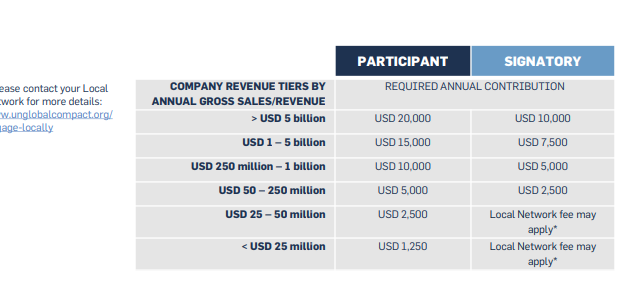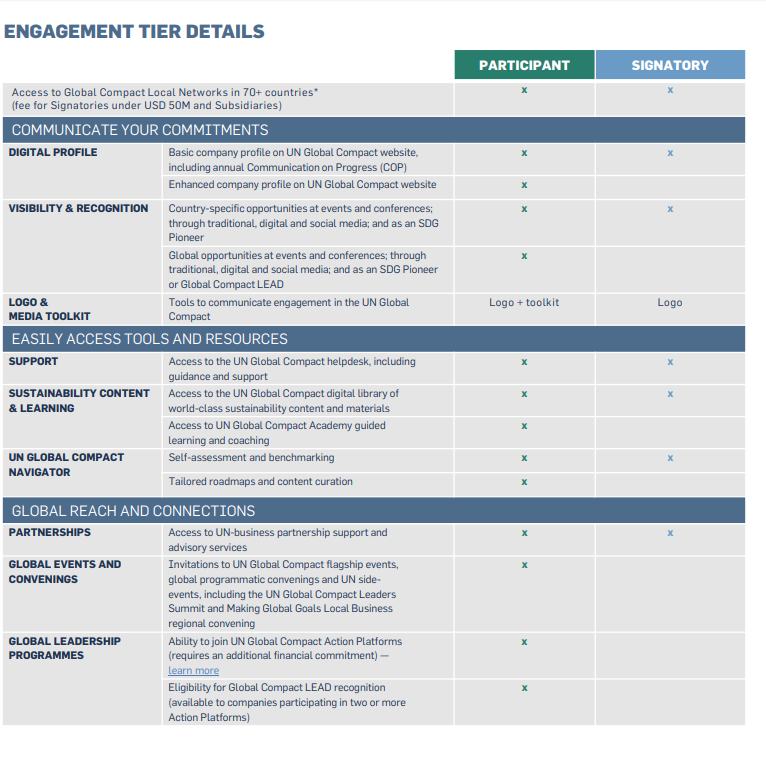The UNGC global is a call to companies to align strategies and operations with ten universal principles. Since 2018, companies need to select their tier engagement, e.g. to which extent they support the UNGC. In this article DFGE presents the highlights and advantages of both solutions, to help you decide which tier you want to benefit from.
UNGC Process: how does it work
Before we start presenting the two UNGC tier options, let’s see what is common to both.
All companies are required to send a letter of commitment, showing that they pledge themselves to the UNGC principles.
Then, companies are required to publish a report to show which actions they have implemented to match such pledge, and their related indicators. For example, for the Principle 6 “Businesses should uphold the elimination of discrimination in respect of employment and occupation”, you can report on a training on discrimination, with the indicator of the % of the workforce that attended it.
Such report called COP (Communication On Progress) is due yearly. You can choose to which extent you report based on COP active, or COP advanced. Such COPs now also checks how you report and act on the Sustainable Developments Goals (SDGs), which are the UN Sustainability Agenda for 2030.
Companies also need to pay an annual contribution of the UNGC, which depends on their tier engagement (signatory and participant) and on their revenues (see table below).
Source: https://www.unglobalcompact.org/docs/publications/UNGC-Value-Proposition.pdf (p. 10)
UNGC Tier: Signatory and Participant
The two UNGC Tier engagement are Signatory and Participant. Below is a table summing up the options of both:
Source: https://www.unglobalcompact.org/docs/publications/UNGC-Value-Proposition.pdf
Participant is an all-inclusive package whereas signatory can be considered a starter.
UNGC Tier: Signatory, a starter engagement
Signatory benefit from the visibility on the UNGC website and can use the logo ‘We Support’ to show they endorse external CSR initiative. This can be meaningful for companies starting with sustainability and CSR, as they show their commitment to an internationally recognized initiative. In addition, such framework can help further structure the own internal management.
In addition, by publishing a yearly COP, the companies can use it as a basis for a sustainability report. The advantage is that the Active COP leaves rooms for some flexibility, as you choose yourself which actions you want to report on, and which indicators are related to it.
However, for first-timers, such flexibility can be also a problem as you won’t know exactly what you can report. In this sense, there are various resources by the UNGC, e.g. the UNGC Helpdesk or their library. What you can also do is opt for external services such as the DFGE Complete UNGC solution, where we would help you structure such first report, by making a gap analysis of what you have internally and what is a best practice.
We definitely recommend this UNGC tier engagement option for the purposes of supporting an external initiative and having a flexible structure for a CSR report.
UNGC Tier: Participant, for companies looking for more cooperation
The Participant option also brings the benefits described above. However, we would definitely recommend such tier engagement in the case of companies looking for more in-depth feedback, with the tailored roadmap and the UNGC Academy with learning and coaching. In this sense, companies know how to react on dedicated topics, and know their gaps to move forward.
In addition, the key advantage of the Participant option, in our mind, are the numerous opportunities for networking: Global events, local events, the UNGC Action platforms, … If you want to address specific topics, understand best practices, exchange actively with other peers (in your sector or not), then this Tier Engagement option seems more appropriate for your company.
Of note the Action Platforms really address current paramount CSR topic such as decent work in global supply chains, Sustainable Ocean Business etc. A way to decide your Tier Engagement option can also be to look at such platforms and check if one of this is a critical topic for you: https://www.unglobalcompact.org/sdgs/action-platforms
We hope this overview helps you identifying your Tier Engagement option. In any case, DFGE recommends adhering to the UNGC when you want to show external endorsement or when you are looking for a framework to structure your reporting.
We wish you lots of success in the completion of your sustainability and program! Feel free to contact us directly to discuss such topics: or at +49.8192.99733-20.











